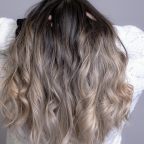
Brits warned of hair infection and increased shedding during heatwave
While the recent UK heatwave has been tempered by wind and rain, mercury levels are expected to rise again in certain parts of the country, reaching temperatures above 30°C, according to WXCharts. As Brits brace for another scorcher, an expert has warned that while heatwaves pose various risks, they can also be incredibly damaging to your hair.
According to Dr Gizem Seymenoglu, a hair loss specialist and medical aesthetician with Longevita Hair Transplant, you can, directly and indirectly, damage your hair during a heatwave, potentially experiencing increased shedding and even an infection.
“High UV levels during a heatwave can lead to increased keratin breakdown in the hair, and this protein is particularly important because it gives your hair strength, health and elasticity. Degradation of it, however, can lead to dry, brittle hair that tends to break more easily.
Worse yet, the heat will exacerbate this dryness by stripping your hair of its moisture. Additionally, it can affect the hair cuticle — the outermost protective layer of your hair shaft, acting as a barrier and providing protection to the layers below. If that is compromised as well, it will make your hair more susceptible to damage.”
Beyond hair damage, the aesthetician also drew attention to the potential harm the skin of your scalp can experience.
“We all know that prolonged sun exposure can cause sunburn, but sunburn can increase your risk of developing skin cancer, including melanoma. Individuals with alopecia should be especially cautious, as the absence of hair removes a crucial barrier against the sun’s rays, increasing vulnerability.
This doesn’t mean that UV rays can’t penetrate through the hair — they still very much can, which is why wearing sun protection is important.”
Additionally, the expert cautioned those heading to the pool for a refreshing swim: “The scorching temperatures will likely drive many to seek frequent refuge in swimming pools, and this is when your hair can start to suffer.
While chlorine keeps pool water germ-free, it can be quite harsh and stripping for your hair. As well as causing dryness and hair breakage, it can fade your hair's colour.
Also, with unclean swimming pools, there’s an increased risk of developing folliculitis, which is an inflammation or infection of the hair follicles caused by microorganisms like bacteria, fungi and viruses.”
Dr Gizem emphasizes sunscreen's importance for protecting your hair and scalp: “With a spray-on or powder sunscreen, you can easily ensure that your hair and scalp are protected. While cream-based sunscreens can also be used, they can get a bit messy, although they can work perfectly for someone with alopecia. Just make sure that you use enough sunscreen to cover the entirety of your head.”
The expert also advises that if you’re going for frequent swims, make sure to reapply the sunscreen after every swim. Moreover, Dr Gizem recommends additional sun protection measures, including wearing a hat when stepping out and staying under a shade when the sun’s strongest.
“It’s also important to keep the hair hydrated and moisturised, and for that, you can consider using a hair mask or a serum, particularly one with hyaluronic acid in it. Of course, you should also drink lots of water to make up for what is lost. Lastly, if you’re going for a swim, wear a swim cap and do not get into a dirty pool!”













